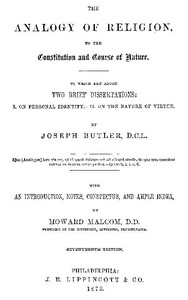The Analogy of Religion to the Constitution and Course of Nature by Joseph Butler
"The Analogy of Religion to the Constitution and Course of Nature" by Joseph Butler is a philosophical treatise written in the early 18th century. This work examines the relationship between natural theology and revealed religion, arguing that the principles found in nature demonstrate the validity of Christian doctrine. It unfolds a systematic examination of both natural and revealed theology, addressing objections while establishing a foundation for the coherence of Christianity with the
observable world. The opening of the work presents an exploration of Butler's intent and methodology, establishing an analogy between the natural order and divine governance. He suggests that just as the natural world operates under discernible laws and principles, so too does divine governance embody a moral system that is just and rational. Through his examination, Butler seeks to demonstrate that the elements of moral government are reflected in the structure of the universe, aiming to dispel doubts about Christianity using reason and observation from nature as supporting evidence. His nuanced approach confronts skepticism regarding personal identity, virtue, and the moral obligations of humanity in relation to divine authority. (This is an automatically generated summary.)
Read or download for free
| How to read | Url | Size | |||
|---|---|---|---|---|---|
| Read now! | https://www.gutenberg.org/ebooks/53346.html.images | 1.1 MB | |||
| EPUB3 (E-readers incl. Send-to-Kindle) | https://www.gutenberg.org/ebooks/53346.epub3.images | 394 kB | |||
| EPUB (older E-readers) | https://www.gutenberg.org/ebooks/53346.epub.images | 409 kB | |||
| Kindle | https://www.gutenberg.org/ebooks/53346.kf8.images | 751 kB | |||
| older Kindles | https://www.gutenberg.org/ebooks/53346.kindle.images | 659 kB | |||
| Plain Text UTF-8 | https://www.gutenberg.org/ebooks/53346.txt.utf-8 | 885 kB | |||
| Download HTML (zip) | https://www.gutenberg.org/cache/epub/53346/pg53346-h.zip | 361 kB | |||
| There may be more files related to this item. | |||||
Similar Books
About this eBook
| Author | Butler, Joseph, 1692-1752 |
|---|---|
| Editor | Malcolm, Howard, 1799-1879 |
| Title |
The Analogy of Religion to the Constitution and Course of Nature To which are added two brief dissertations: I. On personal identity. II. On the nature of virtue. |
| Note | Reading ease score: 47.9 (College-level). Difficult to read. |
| Credits |
Produced by Marilynda Fraser-Cunliffe and the Online Distributed Proofreading Team at http://www.pgdp.net (This book was produced from scanned images of public domain material from the Google Books project.) |
| Language | English |
| LoC Class | BT: Philosophy, Psychology, Religion: Christianity: Doctrinal theology, God, Christology |
| Subject | Revelation |
| Subject | Natural theology |
| Subject | Apologetics -- Early works to 1800 |
| Subject | Eschatology |
| Subject | Analogy (Religion) |
| Category | Text |
| EBook-No. | 53346 |
| Release Date | Oct 22, 2016 |
| Copyright Status | Public domain in the USA. |
| Downloads | 290 downloads in the last 30 days. |
| Project Gutenberg eBooks are always free! | |

